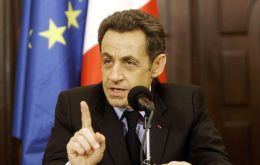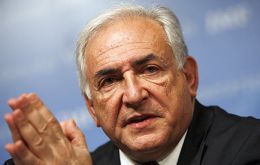MercoPress. South Atlantic News Agency
Tag: currencies
-
Friday, March 6th 2020 - 08:48 UTC
Latin American currencies weakened on Thursday's; Brazil Real slides to a record low

Latin American stocks and currencies weakened on Thursday, with Brazil's real slipping to yet another record low, as the rapid spread of the coronavirus sapped risk appetite and investors worried about the scale of the economic fallout.
-
Wednesday, June 19th 2019 - 09:57 UTC
Latam stocks and currencies surged on Tuesday on favorable global news

Latin American stocks and currencies surged on Tuesday with a dovish boost from the European Central Bank and positive headlines from the U.S.-China trade tensions boosting sentiment.
-
Saturday, May 4th 2019 - 09:56 UTC
Brazil and Argentine currencies recover against a weaker US dollar

Latin American currencies ended on a high note on Friday against a weaker dollar after robust U.S. jobs data painted a brighter picture for global growth and gave the U.S. central bank more reason to stay on its dovish path.
-
Tuesday, June 26th 2018 - 08:22 UTC
Latam stocks and currencies hit by global trade disputes

Latin American stocks and currencies mostly fell on Monday as the trade dispute between the United States and other leading economies worsened, but central bank intervention kept the Brazilian real steady.
-
Wednesday, July 10th 2013 - 05:57 UTC
Global Euro use slips in 2012; Dollar remains king; Canada and Australian currencies emerge

International use of the Euro slipped last year because of the debt crisis in Europe, but the US dollar held its own as the world’s leading currency for reserves held by central banks, according to the European Central Bank.
-
Tuesday, September 27th 2011 - 22:42 UTC
Latam currencies weakness ‘transitory’ says Mexican central bank

Mexican central bank Governor Agustin Carstens said the Peso’s weakness is “transitory” and the currency is likely to resume its upward trend, along with other Latin American currencies.
-
Friday, April 1st 2011 - 00:03 UTC
G20 leaders closer on agreeing greater global role for Chinese currency

G20 leaders have moved towards agreeing that China's currency should have a wider role in global finance. The G20 is to study whether to include the Chinese Yuan within the basket of currencies that make up the IMF Special Drawing Right.
-
Monday, February 21st 2011 - 07:09 UTC
Argentina satisfied with G20 proposal to stimulate food production

Argentina is satisfied with the outcome of the G-20 ministerial meeting after the proposal to regulate commodities prices was turned down, particularly in the food chapter, and because it was agreed that the best way to address current tensions is to stimulate supply.
-
Monday, February 7th 2011 - 20:54 UTC
Geithner implicitly endorses “capital controls” during Brazilian visit

US Treasury Secretary Timothy Geithner reached out to Brazil by citing a shared concern - China - and endorsing Brazil's approach for dealing with global economic distortions.
-
Wednesday, October 6th 2010 - 02:15 UTC
IMF chief admits danger of “currencies as a policy weapon”

Countries risk undermining the global economic recovery if they use their currencies to try to boost domestic growth, the head of the International Monetary Fund warned on Tuesday in a newspaper interview.
